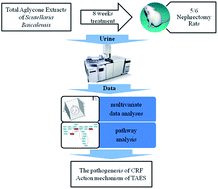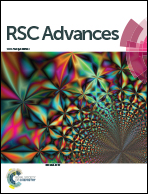A urine metabonomics study of chronic renal failure and intervention effects of total aglycone extracts of Scutellaria baicalensis in 5/6 nephrectomy rats
Abstract
Chronic renal failure (CRF) is a severe disease that can lead to a decline of life quality. Radix Scutellariae is a well-known traditional Chinese medicine (TCM). Our previous study has demonstrated that the Total Aglycone Extracts of Scutellaria baicalensis (TAES), can improve renal fibrosis induced by mercuric chloride in rats. However, no research has investigated the efficacy and mechanism of TAES in treating CRF. In the present study, we investigated the effects of TAES on some closely related parameters in 5/6 nephrectomy CRF rats, and studied the pathogenesis of CRF and the mechanism of TAES treatment using a metabonomics method based on gas chromatography coupled with mass spectrometry (GC/MS). Rats with CRF were divided into six groups with rats subjected to a sham operation as the normal control. After eight weeks of treatment by TAES, the levels of serum creatinine (Scr) and blood urea nitrogen (BUN) were decreased, and the metabolic perturbations induced by 5/6 nephrectomy were reversed according to pattern recognition analysis. Meanwhile, 18 potential biomarkers associated with CRF were identified, and the affected metabolic pathways in 5/6 nephrectomy rats were extracted based on the differential metabolites. Our findings suggest that TAES have positive effects on 5/6 nephrectomy-induced CRF in rats and show therapeutic potentials in CRF treatment. Our findings also indicate that metabonomics analysis based on GC/MS is a useful tool for studying the effect of drugs on the whole body, exploring biomarkers involved in CRF and elucidating the potential therapeutic mechanisms of TCM.


 Please wait while we load your content...
Please wait while we load your content...